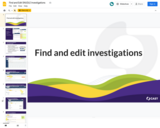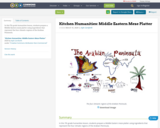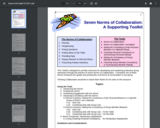
Guide teachers and teams to identify and articulate team goals to keep everyone working toward a common vision.
- Subject:
- Education
- Material Type:
- Teaching/Learning Strategy
- Author:
- Kristin Robinson
- Date Added:
- 03/11/2024

Guide teachers and teams to identify and articulate team goals to keep everyone working toward a common vision.

OASIS3-MCT is a coupling library that can be used to exchange information between codes modelling the different components of the Earth System, for example the ocean and the atmosphere. In this training, consisting of a series of videos, you will learn how to use OASIS3-MCT to set up a coupled model exchanging coupling fields. This material is based on a SPOC (Short Private Online Course) developed in the framework of the ESiWACE CoE. It is fully valid for OASIS3-MCT_5.0 and previous versions. To gain full knowledge on how to build a coupled model with OASIS3-MCT, we strongly encourage you to follow the SPOC in addition to your visit to the current OER pages. For questions, please contact oasishelp@cerfacs.fr

Micro video for finding and editing SNUDLE Investigations. For use by coaches, science specialists, and teachers.

In this 7th grade humanities lesson, students prepare a Middle Eastern meze platter using ingredients that represent the four climatic regions of the Arabian Peninsula.

From Thinking Collaborative, a toolkit of resources for starting, developing, and supporting effective, productive team collaboration.

Providing opportunities for all voices to be heard and all contributions to be recognized is an effective strategy for building science understanding, collaboration skills, and promotes successful group work.

Link to a simple graphic to support group discussion. This simple graphic points out three common ways children participate in discussions (repeating ideas, adding on to ideas, or proposing a new idea).

To build collaboration skills, ensure that each group member has an important role that contributes to the success of all.

To build collaboration and science expertise, try doing a jigsaw activity with students. The jigsaw strategy has been shown to improve social interactions in learning and support diversity.

Mastery and wise feedback can happen anytime. Use Mastery Oriented Feedback and Wise Feedback starters whenever students are trying something new or challenging.

Research has shown that peer feedback is especially helpful for the student giving the feedback. When peers are looking at other students work, they often report seeing the gaps in their own thinking, and then go back to their own work, revise, and improve.

Research shows that reflection and connecting with real-life situations are powerful and effective ways to build science sensemaking skills.

This quick strategy promotes communication skills and collaboration across science groups.

Every group has some people who participate a lot, and some who rarely speak. Yet, everyone has something to contribute AND something to get from hearing the voices of others. This strategy helps give everyone in the group space to speak and to listen.

Science is exciting and is always in action around us. Getting learners to realize that sometimes needs a dramatic or compelling story.Prime interest, connect science concepts with the real world, and build background knowledge with a hook. Try starting with a video, image or intriguing question to help students begin thinking about and making connections with a concept.

Tips for ensuring that all learners participate in data collection.